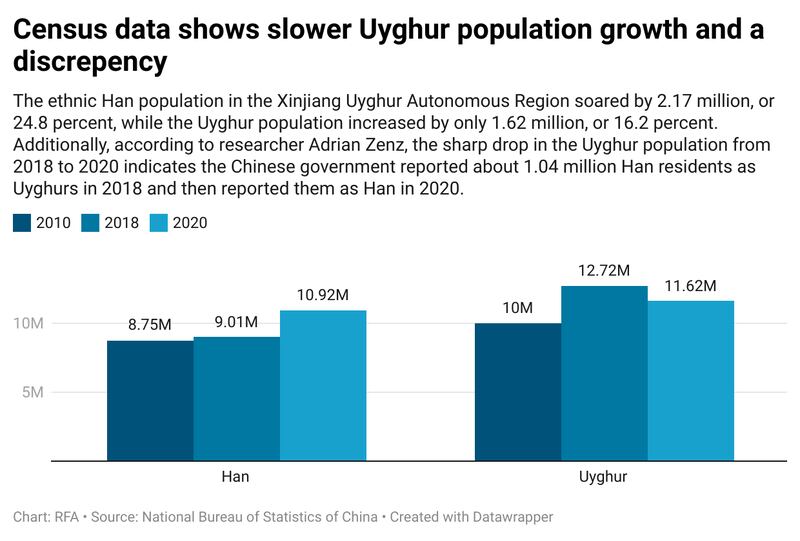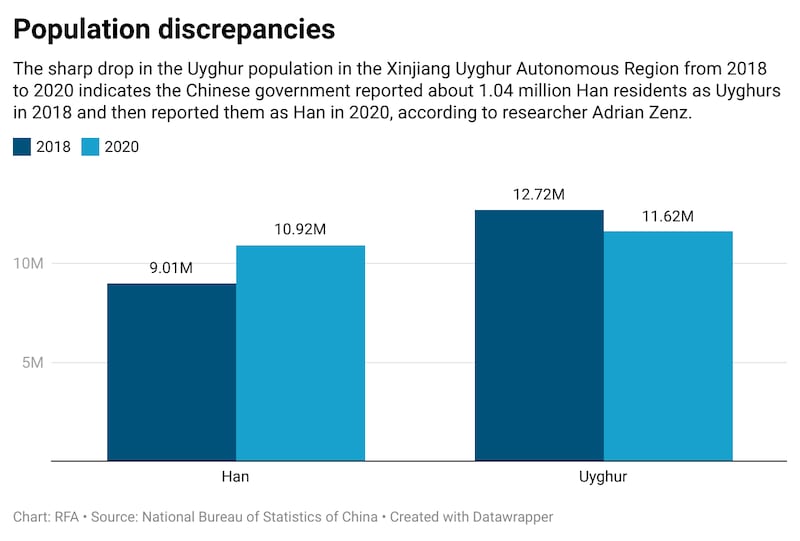China appears to be taking measures to sharply reduce ethnic minority population growth in the southern Xinjiang Uyghur Autonomous Region (XUAR) under “population optimization” policies amid its crackdown on Uyghurs and other Muslims, according to a new report by a German researcher.
Adrian Zenz’s report indicates that Chinese birth control and population transfer policies could result in a large drop in births among Uyghurs of 2.6 million to 4.5 million by 2040, based on population projections by Chinese researchers. There are about 12 million Uyghurs in the XUAR.
Official Chinese data presented in the 28-page report titled “End the Dominance of the Uyghur Ethnic Group: An Analysis of Beijing’s Population Optimization Strategy in Southern Xinjiang,” indicate that birth rates in the southern XUAR have dropped by 48.7 percent between 2017 and 2019, writes Zenz, an independent researcher with the Washington-based non-profit Victims of Communism Memorial Foundation.
The report on China’s policy to reduce population growth in the Uyghur heartland comes at a time when Western nations and rights groups have called for a probe into Beijing’s policies in the XUAR — internment camps, forced labor, and coercive birth control — to determine whether they constitute genocide.
China angrily denies it is committing atrocities or genocide in the XUAR.
The peer-reviewed report includes research by Chinese officials and academics that show that policies in Xinjiang, such as mass sterilization of women, are driven by the view that the Uyghur population’s size, concentration, and rapid growth are a national security threat that must be addressed.
Based on official birth data, demographic projections, and ethnic ratios proposed by Chinese academics and officials, Zenz estimates that the policies could increase the Han population in the southern XUAR to about 25 percent from its current 8.4 percent.
Zenz has published previous reports on abortions in the XUAR, forced labor, and the internment of an estimated one million Uyghurs and other ethnic minorities in a network of camps.
His work has been cited as evidence that the Uyghurs are being destroyed as a people by those making the case of genocide under the United Nations legal framework.
Zenz and others note that the 1948 Convention on the Prevention and Punishment of the Crime of Genocide lists birth prevention targeting an ethnic group as an act that could qualify as genocide.


China slams report
Chinese officials have slammed Zenz’s recent findings, as they have his other research on the mass detention of Uyghurs and other Turkic Muslim minorities within China's Xinjiang re-education camps, transfers of Muslim laborers to other regions, and birth reductions in the XUAR.
In an op-ed published on June 10, the state-run TV outlet CGTN said Zenz was driven by “spiritual beliefs” to portray a slowdown in population growth in Xinjiang as evidence of deliberate policies to reduce the Uyghur population.
“No genocide is taking place in Xinjiang. Instead, a media-savvy mix of separatists and religious zealots are being used by frightened geopolitical rivals to distract China, isolate it diplomatically, and slow down its rise,” it said.
“And Adrian Zenz’s latest paper shows the desperation of the people manufacturing these lies laboring mightily yet futilely to sustain them,” said CGTN.
More than 30 witnesses and experts, including Zenz, provided testimony to a “Uyghur Tribunal” held in London on June 4-7 that aimed to gather evidence on whether the Chinese government’s alleged human rights abuses in the XUAR constitute genocide. The nine members of the panel, which has no state backing, will hold a second round of hearings in September and are expected to issue a non-binding verdict in December.
“Beijing’s strategy in Xinjiang is not one of population destruction, but population control,” Zenz said when discussing his findings at a June 10 hearing on the atrocities in the XUAR held by the U.S. Senate Foreign Relations Committee. “It’s a mass atrocity without mass slaughter, one with human rights violations of historic proportions, but leading to a loss of millions of lives potentially.”
China has held up to 1.8 million Uyghurs in a network of detention camps since 2017. Beijing has said that the camps are vocational training centers or re-education centers and smaller numbers of Kazakhs and Kyrgyz, fellow Turkic speaking people, have also been incarcerated in the camp system.
The democratic parliaments of Belgium, the Czech Republic, Canada, the Netherlands, the United Kingdom, and Lithuania have passed motions determining that China’s policies in the XUAR constitute genocide.
The U.S. government in January designated abuses in the region as part of a campaign of genocide, and the German parliament is conducting an inquiry into the allegations.
